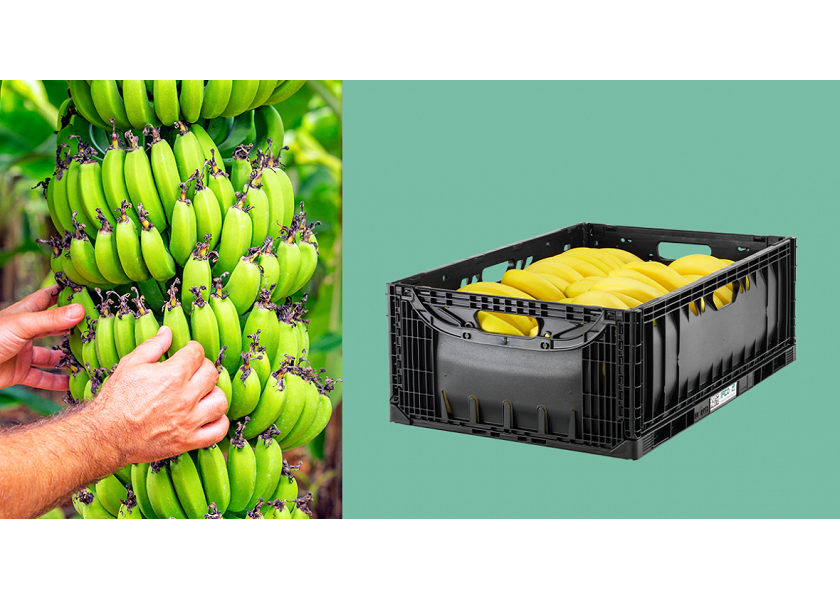IFCO white paper highlights Banana Lift Lock system benefits

Getting the right quantity of bananas to consumers in a perfectly ripened condition is hard enough.
Delivering those bananas with the lowest possible carbon released along the journey is another daunting challenge, according to a recent white paper by IFCO Systems, which specializes in reusable packaging.
Michael Meierhöfer, vice president of sales of new market verticals at IFCO, outlined sustainable solutions in the banana supply chain in a white paper that looks at IFCO’s Banana Lift Lock trials and launch.
He said consumer behavior is changing, with increased consumer opposition to single-use packaging and one-way containers, as well as growing interest in sustainable reusable packaging.
Using IFCO reusable packaging containers from the plantation through to the point of sale achieves a significant reduction in food loss and waste, Meierhöfer said in the paper.
Meierhöfer said IFCO's packaging is characterized by the key pillars of the circular economy:
- Resource efficiency: A robust and resilient design ensures the containers are shared and reused over many years;
- Waste elimination: IFCO containers typically have a life cycle of at least 10 years and are closely managed in a unique, continuous closed loop pooling and production system; and
- Material reutilization: At end-of-life, 100% of the material from old or broken reusable containers is used to produce new containers of a consistently high quality.
“IFCO keeps materials in a closed loop to conserve resources and avoid depletion of raw materials,” the white paper said. “The design of all IFCO [reusable packaging containers] ensures that packaging is reused, and not just once, but over many years. The IFCO SmartCycle therefore eliminates waste and protects fresh produce, which further eliminates waste.”
Progress
Traditionally, bananas have been transported in one-way containers or single-use packaging, the white paper said.
Replacing those one-way containers with long-term reusable packaging provides a key to improving the supply chain’s sustainability, the white paper said, and is the reason IFCO has developed the Banana Lift Lock container.
“Using reusable packaging to help prevent deforestation is relevant for the transport of conventional bananas just as much as it is for organic produce,” Meierhöfer said in the paper. “Reducing waste is necessary, whatever the production process. However, when bananas are produced in a way that respects the environment, according to sustainable farming practices, transporting bananas in reusable packaging is simply the cherry on the cake.”
With input from the supply chain, IFCO has developed a new kind of reusable banana crate, one that replaces single-use packaging and brings enhanced performance along the entire value chain,” he said.
The IFCO Banana Lift Lock slots seamlessly into the existing sophisticated demands of long-established logistics operations, the white paper said.
Studies based on the fresh grocery supply chain in Europe and the U.S. have determined that IFCO containers produce up to 60% less carbon dioxide and 86% less solid waste, according to the white paper. They also use 64% less energy and 80% less water than single-use packaging.
“Using the IFCO reusable crates supports our sustainability targets and decarbonization processes. The robustness of these [reusable containers] also helps preserve product quality and the environment,” Vincent Omer-Decugis, CEO of French produce distributor Omer-Decugis & Cie, said in the white paper.
IFCO has been providing sustainable reusable packaging solutions for fresh produce for 30 years, Meierhöfer said in the white paper. “As with every product development, we started with the challenges of the sector and created a packaging solution to support sustainability in the banana trade.”
IFCO’s Banana Lift Lock prototypes have been sent all the way from Latin America to Europe, and have been thoroughly tried and evaluated under real-world conditions, according to the white paper.
“The use of the IFCO Banana Lift Lock provided convincing results from plantation through to point of sale,” the white paper said. The design of the Banana Lift Lock allows for faster and more efficient cooling, according to the white paper.
More information on the system and a link to the white paper is available here.







